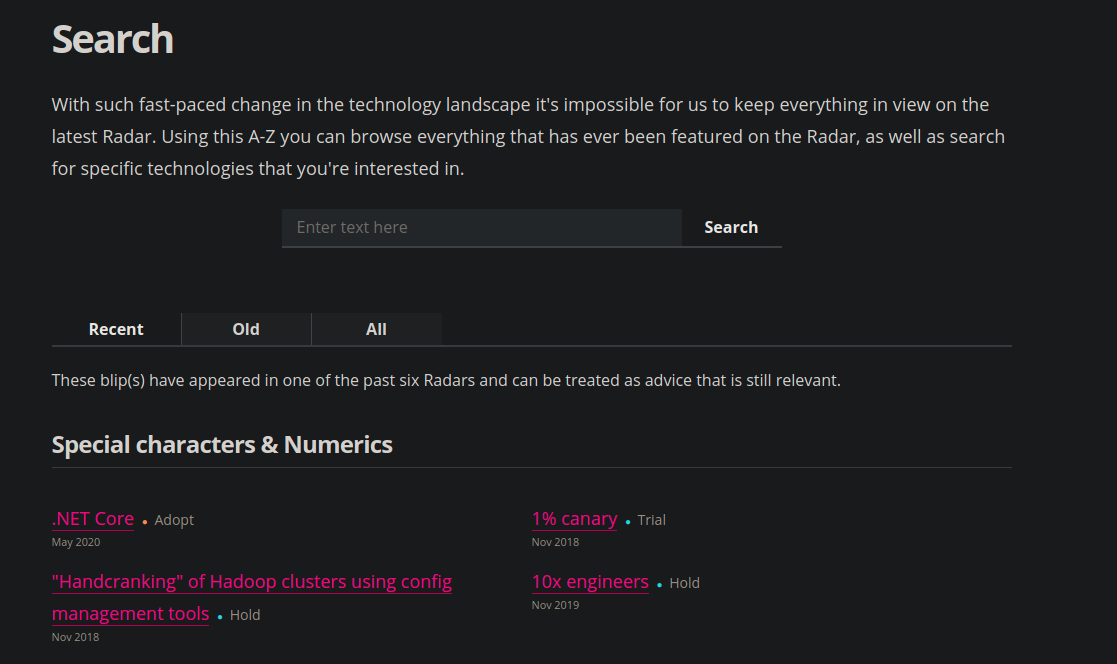I use ThoughtWorks guides regularly to keep up with technology trends. The 24th Technology Radar volume has been available for a while so I decided to share the topics that I plan to explore in my spare time.
A few personal takeaways
Based on personal preferences, I’ve chosen to start researching the following concepts and technologies first. I plan to include them in some of my projects to learn more about them.
Languages & Frameworks
- Angular Testing Library
I’m eager to gain more understanding of writing tests for UI components in a user-oriented way. I really hope that focusing on behaviour rather than simply rendering components will give me a comprehensive and easy to maintain test suite. The library documentation promises that the tests won’t break when we change only the implementation and not the functionality of our code.
Tools
- Sentry
I’m always curious about new ways of monitoring my applications, finding errors and identifying performance bottlenecks. Particularly, I want to test how Sentry supports Angular and how easy it is to use their SDK. - axe-core
I want to improve my focus on accessibility and work on it right from the beginning of a project. Therefore, I will check how much this automated accessibility testing engine can facilitate my efforts. - Spectral
I use the OpenAPI spec a lot and want to test this linter’s ability to enforce the appropriate style guidelines.
Techniques
- API expand-contract
Tackling backwards incompatible interface modifications can be a real headache for its clients. To make the transition easier we can introduce the changes in separate steps and allocate enough time for the clients to adjust. Then we can phase out the deprecated interface. - Design systems
Those guides provide instructions for delivering consistent products and eliminating waste when facing strategically similar design problems. They should be easy to share, use and maintain across multiple teams. I’m going to look for some inspirations, starting with this list of design systems, style guides and pattern libraries. - Ethical Explorer
It’s a set of questions and activities that help recognize the future impact of current technology. Useful for discussing the various implications of using technology and how to prevent its negative consequences. - Team cognitive load
Planning the responsibilities of team members requires understanding the dynamics and interactions between them. In addition, we need to know what the actual workload of building, testing, and maintaining an application is, and what the team thinks about it. - Privacy-focused web analytics
This technique allows the collection of web analytics, while maintaining the true anonymity of end users. I plan to test the Plausible – an open-source website analytics tool that promises full compliance with GDPR, CCPA and PECR without the invasive cookie consent forms. You can set it up on your own server for free or choose the appropriate subscription tier. I’m going to start with their free trial.
What I’m happy to see in the Hold section
On the other hand, I was delighted to see the following techniques listed in the Hold section:
- Layered platform teams
Dividing teams by technology layer creates organizational and communication overhead. By contrast, organizing teams around business capabilities allows us to build software that better suits our customers’ needs. - Naive password complexity requirements
Requiring users to use confusing and randomly selected character sequences can provide a sense of security when designing password policies. However, this security is superficial. Long enough and easy-to-remember phrases are safer as users won’t try to bypass security requirements to make their lives easier (e.g. reusing passwords, writing them down, etc.). - Peer review equals pull request
There is no point in delaying peer reviews until a pull request is issued. Obtaining frequent and early feedback will help establish a common understanding and shared ownership of the code. - Scaled Agile Framework®
Organisational changes shouldn’t be imposed solely by management. Keeping the “Individuals and interactions over processes and tools” rule is crucial for maintaining a value-driven approach.
How to search for a technology across all Technology Radar volumes
If you’re interested in a specific technology, you can easily browse everything that has ever been featured on the Technology Radar. For this purpose, visit the Radar Search:

Thanks to this, you can track the Radar history of all featured technologies.
Summary
Below you’ll find some useful links to navigate through the guide.
Highlighted Themes
- Platform Teams Drive Speed to Market
- Consolidated Convenience over Best-in-Class
- Perennially “Too Complex To Blip”
- Discerning the Context for Architectural Coupling
Sections
Download the 24th Technology Radar edition
Finally, you can grab the PDF version in English or in other supported languages.
It’s extremely difficult to stay on top of the rapidly developing technology scene. Therefore, I’m happy to have the 24th Technology Radar edition by my side. You can also read the other posts about the Technology Radar volumes I posted on this blog.
Photo by Darren Lawrence from Pexels
